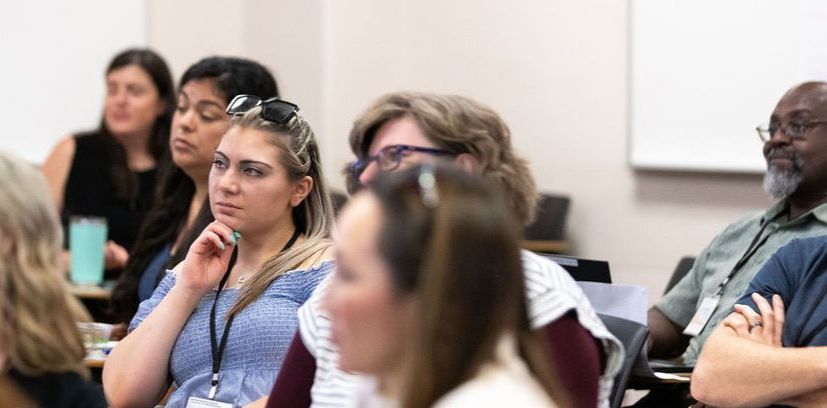Building Safer Schools: Inclusive Classroom Strategies from a Districtwide Training
When Antisemitism Strikes a Classroom, What Can a High School Do?

After an antisemitic incident rocked a Bay Area high school last year, district leaders turned to the JFCS Holocaust Center for support. In partnership with the California Teachers Collaborative, led by the JFCS Holocaust Center, they developed a timely and thoughtful approach to addressing antisemitism in schools. More than 375 educators and administrators—from teachers and counselors to site and district leaders—participated in the training, leaving with practical tools ready to apply as students returned to the classroom.
When asked what they were taking away from this training, one teacher replied:
“The power to inspire and help students gain different perspectives by becoming more open and less prejudiced.”
AT A GLANCE
375+ educators trained in one day
12 workshops led by expert facilatators
3 out of 4 can now identify and interrupt antisemitism
1 survivor testimony that grounded the day in lived experience
What the Day Covered
Grounding in lived experience:
The training opened with Holocaust survivor testimony. George Elbaum, who was just one year old when the Nazis invaded Poland, survived the war in hiding after being smuggled out of the Warsaw Ghetto. He shared his story in conversation with Morgan Blum Schneider, Director of the JFCS Holocaust Center, underscoring the human consequences of antisemitism and the responsibility educators hold in shaping inclusive school cultures today.

Twelve hands-on workshops:
Expert facilitators from JFCS Holocaust Center and Facing History & Ourselves led sessions on:
- Historical and contemporary forms of antisemitism
- The diversity of Jewish identity and lived experience
- Practical frameworks for responding to bias and fostering belonging
- Using the 4-D Test to evaluate rhetoric and spot antisemitic tropes (The 4-D Test offers a clear rubric to help distinguish between fair critique and prejudice, to promote respectful, informed dialogue shaped by shared values and historical awareness.)
- Strategies for supporting Jewish students through curriculum choices, classroom routines, and schoolwide practices
Ready to use resources:
Participants left with protocols, reflection prompts, discussion norms, and lesson ideas designed to work across grade levels and subject areas.
Why This Training Matters in This Moment
Antisemitism is not abstract. Over the past year in California, there were 1,534 reported antisemitic incidents, and nearly half—47%—took place on school campuses. And while Jews account for roughly 2% of the U.S. population, they experienced nearly 70% of reported religious-based hate crimes in 2024, according to FBI data. Schools are on the front lines—educators need classroom resources, aligned practices, and community partnerships to respond consistently and prevent future harm.
While this training was initiated as a response to a harmful incident, it offered more than corrective action. It represented a meaningful shift: education over punishment, support over silence, and a sustained effort to build inclusive classrooms beyond one-off assemblies.
Early results
After the training, educators reported strong gains in confidence and capacity:
- 3 out of 4 teachers agreed or strongly agreed they now have strategies and resources to identify and recognize antisemitism in historic and contemporary contexts.
- 3 out of 4 teachers agreed or strongly agreed they now have strategies and resources to interrupt antisemitism when it surfaces.
What educators said they’re taking back to their classrooms:
“A clearer understanding of antisemitism’s history and how to interrupt it.”
“How to spot antisemitic tropes and address them in the moment.”
“Ways to create more opportunities for student belonging.”
“More language for talking about multiethnic Jewish identity.”
“Definitions and strategies to help me navigate challenges in the year ahead.”
Help Bring This Training to Classrooms and Communities That Need It.
For district and school leaders:
Interested in a customized training on understanding and interrupting antisemitism, supporting Jewish students, and inclusive classroom strategies? The JFCS Holocaust Center can tailor sessions for your staff, department, or full district. Schedule a Curriculum Consultation.
For community members:
There are multiple ways you can help expand this vital work—through giving, advocacy, and amplification.
- Give: Support educator trainings, survivor testimony programs, and classroom resources across the Bay Area and beyond.
Donate to educational programs
Help build Northern California’s one and only Holocaust Center - Stay involved: Share resources, invite a speaker, or host a community conversation



